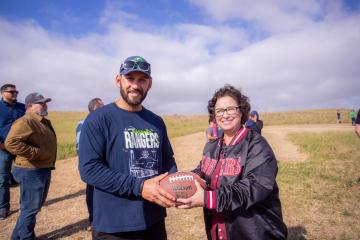Miguel Angel Cerón didn't panic after losing his job of 16 years at a Chula Vista plastics manufacturing company. The Mexico native came up with a plan.
He went back to school. And it's paying off.
Cerón, 50, landed a job last summer as a nursing assistant at a La Jolla rest home. Though he earns less than before, he likes his chances for moving up the pay scale now that that he has improved his English-languageskills and prepared himself to enter the health care field.
"I saw that it was an area where there were jobs," said Cerón, who lives in Paradise Hills.
Across the state, Latinos like other Americans are returning to school to upgrade their skills or acquire new ones to keep up with the changing economy.
Many are enrolling in free or low-cost classes at community colleges. Latinos accounted for 30 percent of the state's community college students in 2009-2010, up from 28.8 percent in 2006, when the economic downturn began, and 25 percent in 2000, according to the most recent state statistics.
In the San Diego Community College District, Latinos make up 25 percent of the student population, up from 22 percent in 2006, and 19 percent in 2000.
Latinos have greater representation in the district's Continuing Education program, which offers English as a Second Language, citizenship and high school equivalency classes in addition to job training and certificate programs.
Latinos make up about one third of the students enrolled at the Continuing Education program's six sites in San Diego.Cerón took classes at three sites.
Murtaza Baxamuza, research director at the San Diego think tank Center on Policy Initiatives, said Latinos have been hit harder by unemployment compared to other groups and are feeling the same pressures as other Americans to improve their education levels.
"It's occupation driven," he said.
In San Diego County,the unemployment rate for Latinos is 13.2 percent, compared to 10.4 percent for the general population, according to the Center on Policy Initiatives.
Cerón, who was laid off in 2008, went back to school initially to improve his English-language skills.
"They were not that good," he said.
He also enrolled in a General Education Development course and obtained a high school equivalency diploma.
"I knew I needed my GED if I wanted to continue studying," he said. "Many schools require that you have a GED."
He attended those classes at the Educational Cultural Complex on Ocean View Boulevard.
Next he took care-giving classes at the César Chávez Continuing Education Center in Barrio Logan and followed that by enrolling in a certified nursing assistant program at Centre City Center near San Diego City College.
He said he worried about his family's finances after he was laid off but had faith that he was doing the right thing going back to school.
"We often ask God for help but we need to help ourselves," said Cerón, who is Catholic. "We always say he has a plan and that there is a reason why things happen but if we cross our arms and wait for something to happen, nothing is going to happen. But if we ask God and start looking for it ourselves something is going to happen."
The Cerón household is still not stable.Cerón's wife, Aurelia, 46, was laid off from her church office job in May.
She has been looking for work, she said, but it can be discouraging at times.
She recently applied for a county job and "there must have been 150 people who applied and took that exam that Saturday."
She hopes to hear from the county but isn't sitting around waiting for the phone to ring. She plans to follow her husband's example and will enroll in the semester-long Office Professional Training program at Grossmont College.
The Ceróns have three children, who are doing well despite their parents' struggles.
Their oldest son, Miguel Ibrahim Cerón, 23, graduated from Harvard University last year and works in New York City.
Their daughter, Anaid, 25, recently married, works at SeaWorld and plans to transfer to the University of California at San Diego.Their youngest son, Diego, is a promising student at The Preuss School in La Jolla and is enrolled in Reality Changers, the after-school, college prep program that helped their oldest son get into Harvard.
The Ceróns feel they are teaching their children valuable lessons about life.
"This is the schooling we're going to give our kids," Aurelia said. "Hard times come but we are not going to be defeated by the times. We're going to fight to move ahead."
Leonel.sanchez@sandiegored.com

















Comments
Facebook
SanDiegoRed
New
Best